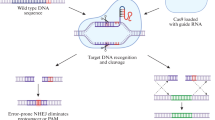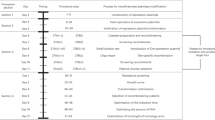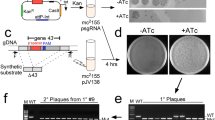Abstract
Traditional low-efficiency homologous recombination between plasmids and phage genome was developed to generate recombinant phages with gene replacement, deletion, or insertion. Here, we describe a protocol for well-known Streptococcus pyogenes CRISPR-Cas9-mediated genome editing of lytic Escherichia coli T4 phage. We introduce two methods for point mutation that yield a BamHI restriction site in the target region and a fluorescent protein tag (GFP) insertion in T4 phage genome as examples. Engineered T4 phages were obtained in 100% efficiency. This protocol can be adapted for any other phage modifications by active heterologous CRISPR-Cas9 in their host.
Access this chapter
Tax calculation will be finalised at checkout
Purchases are for personal use only
Similar content being viewed by others
References
Knott GJ, Doudna JA (2018) CRISPR-Cas guides the future of genetic engineering. Science 361(6405):866–869
Tao P et al (2017) Engineering of bacteriophage T4 genome using CRISPR-Cas9. ACS Synth Biol 6(10):1952–1961
Chen Y et al (2019) Genetic engineering of bacteriophages against infectious diseases. Front Microbiol 10:954
Shmakov S et al (2017) Diversity and evolution of class 2 CRISPR-Cas systems. Nat Rev Microbiol 15(3):169–182
Reisch CR, Prather KL (2015) The no-SCAR (Scarless Cas9 assisted recombineering) system for genome editing in Escherichia coli. Sci Rep 5:15096
Chen Y et al (2020) Specific integration of temperate phage decreases the pathogenicity of host Bacteria. Front Cell Infect Microbiol 10:14
Chen Y et al (2018) Complete genome sequence of a novel T7-like bacteriophage from a Pasteurella multocida capsular type a isolate. Curr Microbiol 75(5):574–579
Author information
Authors and Affiliations
Corresponding author
Editor information
Editors and Affiliations
Rights and permissions
Copyright information
© 2021 The Author(s), under exclusive license to Springer Science+Business Media, LLC, part of Springer Nature
About this protocol
Cite this protocol
Chen, Y., Li, X., Wang, S., Qian, P., Li, Y. (2021). CRISPR-Cas9-Mediated Genome Editing in Escherichia coli Bacteriophages. In: Islam, M.T., Molla, K.A. (eds) CRISPR-Cas Methods. Springer Protocols Handbooks. Humana, New York, NY. https://doi.org/10.1007/978-1-0716-1657-4_21
Download citation
DOI: https://doi.org/10.1007/978-1-0716-1657-4_21
Published:
Publisher Name: Humana, New York, NY
Print ISBN: 978-1-0716-1656-7
Online ISBN: 978-1-0716-1657-4
eBook Packages: Springer Protocols




